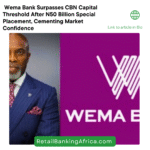Eight Nigerian commercial banks have successfully surpassed the Central Bank of Nigeria’s (CBN) new recapitalisation benchmarks, marking a major milestone in the country’s most ambitious banking reform in over a decade. The announcement was made by CBN Governor Olayemi Cardoso following the Monetary Policy Committee (MPC) meeting held in Abuja this week.
This progress is part of the CBN’s strategic plan to strengthen the banking system’s resilience and align capital bases with the scale of modern banking operations in Africa’s largest economy. Under the 2024 recapitalisation framework, internationally licensed banks must raise ₦500 billion in Common Equity Tier 1 (CET1) capital, while national banks must meet ₦200 billion—a bold move last seen during the historic 2005 Soludo-led consolidation.
According to Cardoso, “Eight banks have already met the capital requirements, and several others are on track.” This progress has been supported by strong investor interest, with both local and foreign capital playing key roles. One major Nigerian bank—believed to be GTCO—has raised significant equity on the London Stock Exchange, highlighting renewed global confidence in Nigeria’s financial sector.
A Proshare Markets report shows Nigerian banks have raised over ₦13 trillion in new equity between Q4 2023 and mid-2025, bolstering their Capital Adequacy Ratios (CAR) and expanding their lending capacity. The industry-wide CAR now stands at 13%, well above the minimum required by Basel II standards. In addition, Non-Performing Loans (NPLs) remain below 5%, a positive indicator of credit health.
Meanwhile, the CBN maintained its Monetary Policy Rate (MPR) at 27.5%, reflecting a balancing act between inflation control and preserving credit growth. Inflation has decelerated slightly in recent months but remains elevated due to persistent supply chain constraints and FX volatility.
Analysts say the recapitalisation push could lead to mergers among Tier 2 banks seeking to meet the higher threshold, increasing competition and consolidation across the sector. High-performing mid-sized banks are already courting investors and exploring regional expansion to justify capital inflows.
Cardoso reaffirmed the regulator’s commitment to ensuring financial stability and proper oversight, stating, “This is not just a numbers game—it’s about building a banking system fit for Nigeria’s future.”











